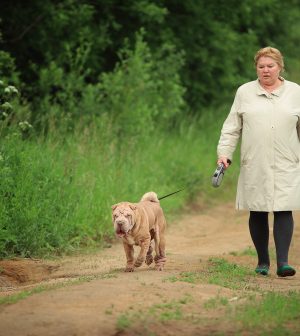- Could Your Grocery Store Meat Be Causing Recurring UTIs?
- Are You Making This Expensive Thermostat Error This Winter?
- Recognizing the Signs of Hypothyroidism
- 10 Strategies to Overcome Insomnia
- Could Artificial Sweeteners Be Aging the Brain Faster?
- Techniques for Soothing Your Nervous System
- Does the Water in Your House Smell Funny? Here’s Why
- Can a Daily Dose of Apple Cider Vinegar Actually Aid Weight Loss?
- 6 Health Beverages That Can Actually Spike Your Blood Sugar
- Treatment Options for Social Anxiety Disorder
Treating Loneliness in the Obese May Lower Risk of Early Death

Loneliness can be a killer, but it can be particularly deadly for obese people, who are markedly more likely to experience social isolation.
Luckily, a new study shows that addressing it may lower the risk of health complications and an early death for these folks.
“To date, dietary and lifestyle factors are the major focus in preventing obesity-related illness,” study author Dr. Lu Qi, interim chair of the department of epidemiology at Tulane University School of Public Health and Tropical Medicine in New Orleans, told CNN. “Our study highlights the importance of taking social and mental health into account in improving health for people with obesity.”
Dr. Philipp Scherer, a professor of internal medicine at the University of Texas Southwestern Medical School, wasn’t surprised by the findings.
But the results do point to improving “social isolation as a potential remedy for the reduction of mortality,” he told CNN.
In the study, researchers looked at data from nearly 400,000 people from the UK BioBank, a large database that has tracked the health of Britons for years.
Those included in the research did not have heart disease when the scientists began collecting data for this latest study. They then followed up with the volunteers between March 2006 and November 2021.
During that period, all causes of death for people who were obese was 36% lower in those who felt less lonely and socially isolated, compared to a 9% decrease in risk of early death among those who weren’t obese or lonely.
“It is the time to integrate social and psychological factors into other dietary and lifestyle factors in the development of intervention strategies for preventing obesity-related [health] complications,” Qi said.
The findings were published Jan. 22 in the journal JAMA Network Open.
While not discussed as often as diet or exercise, loneliness is now being recognized as a major risk factor for poor health outcomes.
People who felt socially isolated were 32% more likely to die early than those who did not, a recent study revealed.
“We need as humans to feel known by other people in order to feel seen — to feel kind of like we exist in the world,” said Rachael Benjamin, a licensed clinical social worker based in New York City.
But fat phobia can make it harder for obese people to feel understood and accepted, she added.
Breaking down that bias is hard, but obese people can try to develop more quality relationships, Benjamin said.
“Two people can feel like they’re both being heard and seen and taken in and can kind of play a little bit,” Benjamin said. “And also feel respected by both people and be honest about how they’re feeling.”
To get there, she recommends asking if you are isolating yourself to protect yourself or out of habit. If you are, make the effort to try to connect with people more regularly.
“Maybe it’s uncomfortable, but maybe I’m willing to be braver, willing to kind of take a chance,” Benjamin said. “It just takes time and work and effort.”
More information
The U.S. Centers for Disease Control and Prevention has more on the health effects of loneliness.
SOURCE: JAMA Network Open, Jan. 22, 2024; CNN
Source: HealthDay
Copyright © 2026 HealthDay. All rights reserved.










